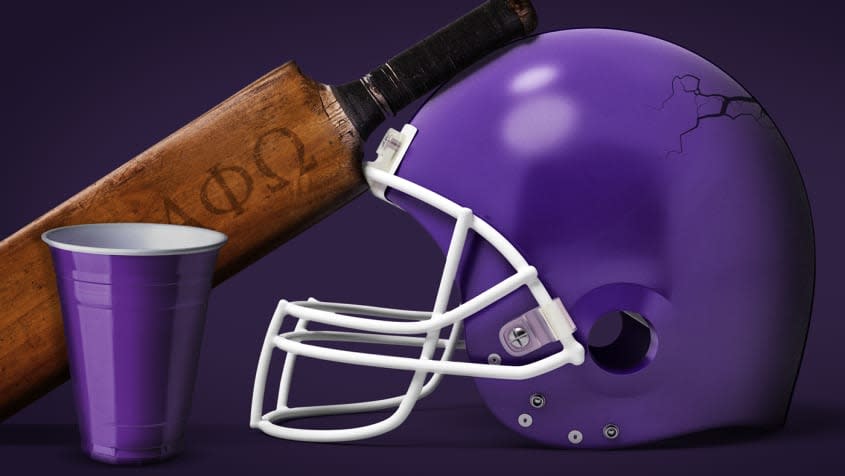America's hazing problem and why nothing seems to change

- Oops!Something went wrong.Please try again later.
A scandal has rocked Northwestern University, as the coach of the school's Division I football team, Pat Fitzgerald, was fired amid allegations of hazing. First reported in the school newspaper, The Daily Northwestern, the allegations detail a longstanding history of "vile and inhumane behavior" within the football program that Fitzgerald is accused of sweeping under the rug. Just days later, the coach of Northwestern's baseball program, Jim Foster, was also fired amid allegations that he's racist and combative with his players.
The firings have led to "deepening concerns over a toxic culture in the university's athletics," The New York Times reported. But Northwestern, known for its prestige and academic prowess, is hardly the only college where hazing remains a problem. Collegiate institutions across the United States have a long history of hazing scandals across numerous environments, including sports programs and Greek life.
Over half of all college students are "involved in some form of campus hazing," according to national figures cited by the University of Maryland. Since 1970, there has been "at least one hazing-related death on a college campus each year." While 83% of hazing incidents involve alcohol, "hazing incidents involving sexual intimidation, nudity or stimulation" have been steadily increasing, the university reported.
Despite continuing issues, there are no federal laws in the United States against college hazing, and not all states have laws against hazing. Forty-four states have implemented anti-hazing legislation, and the "strength and breadth of the laws vary significantly," StopHazing.org reported.
What are some of the worst hazing incidents?
Many of these deaths have occurred at fraternities and sororities. In 2013, Sigma Alpha Epsilon at Arizona State University was ranked as the worst frat for hazing by Rolling Stone, with two incidents in which a "prospective member drowned after a night of binge drinking at a fraternity event" and another where frat members "dumped one of their own in front of a local ER with a Post-it note on his body" after consuming 30 ounces of tequila. Also on the list was Alpha Delta at Dartmouth College, which "provided the real-life inspiration for [the 1978 film] 'Animal House'" and has "long had a reputation for bad Greek behavior," Rolling Stone reported.
The incident that may have gotten the most national traction was the death of Tim Piazza at Penn State University in 2017. Piazza, 19, died from traumatic brain injuries "two days after he fell down a flight of stairs into the basement … during a night of heavy drinking for a pledge acceptance ceremony called The Gauntlet," ABC News reported. An investigation into Piazza's death revealed that the frat he was pledging, Beta Theta Pi, had a "persistent pattern of serious alcohol abuse, hazing, as well as illicit drug use and sales."
While Rolling Stone noted that Greek houses are "places where sexism, racist acts and automatic weapons are alarmingly commonplace," they are hardly unique in pervasive hazing. College athletics have become commonplace for Northwestern-type hazing incidents to thrive, as "74% of student-athletes experience at least one form of hazing while in college," an NCAA study on the issue found. However, while hazing in athletics is often seen as an activity to make the team stronger, 69% of participants "disagreed that hazing made them feel more like a part of the group." Half of college athletes were also hazed in high school, the study found, leading to students that "come to college with the belief that hazing is normal and to be expected."
What has been done about hazing?
All but six states have implemented some type of law against hazing, and these have sometimes led to prosecutions against those responsible. Four former frat brothers were charged and sentenced in connection with Piazza's death, and three of them even received jail time.
These 44 states all punish hazing differently. In Pennsylvania, where Piazza died, hazing that "results in serious bodily injury or death" is a "felony of the third degree," per StopHazing.org. Indiana, meanwhile, outlines different levels of hazing that would fall under various felony penalties. However, in Idaho, for example, hazing is classified as a misdemeanor. Just 10 of the 44 states explicitly outline felony charges for hazing, according to StopHazing.org's data.
There have been instances of extended jail periods for those charged with hazing deaths. Raymond Lam and Sheldon Wong, who were convicted in relation to the death of Chun Deng at Baruch College in 2013, "were given 10 to 24 months each" in jail after pleading guilty to voluntary manslaughter, NPR reported. Another co-conspirator, Kenny Kwan, received 12 to 24 months in jail, NPR reported.
Other sentences, though, have been much lighter. Three men convicted in the death of Stone Foltz at Bowling Green State University in 2021 received just 28-day jail terms.
Why does this continue to happen?
Part of the issue is a cycle of hazing culture ingrained within colleges, and while pledges "might suffer during the hazing process, eventually the tables turn," CNN reported. As a result, "when the next pledge class arrives, the former victims inevitably become the perpetrators, continuing what the group sees as tradition."
"It was always the pledge class that just came out that was gung-ho hazing," one former University of Connecticut student told CNN, adding that they were eager to turn the tide "because they had just experienced it."
At Northwestern, the problem is larger than any athletic program, SB Nation reported. Rather, hazing at the school is a "problem within the university, protecting their self-image and reputation over doing the right thing, and the leaders at the institution have nobody to blame but themselves."
You may also like
Florida construction and agricultural workforces diminished after new immigration law takes effect
Judge limits how Biden officials can communicate with social media companies
How solar and wind energy are saving Texans from a record heatwave

